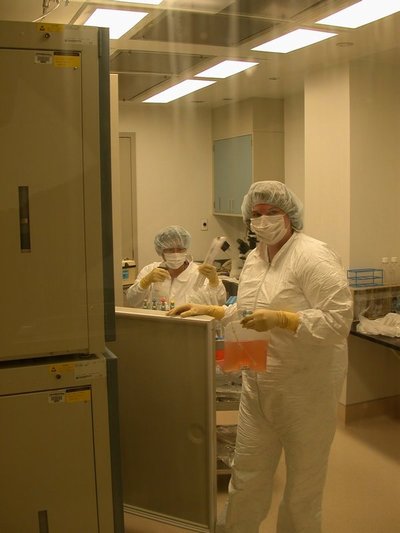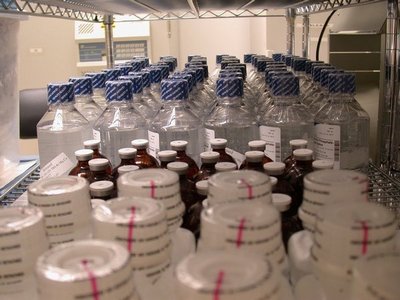June 1, 2006
Gene and Cell Therapy Core Laboratory seeks new challenges
“In a broad sense,” says Dr. Nora Disis, director of the UW’s General Clinical Research Center, “one of the things it’s important for universities to do is to develop new products that improve human health. Along with our affiliates at Fred Hutchinson Cancer Research Center and Children’s Hospital, at UW Medicine we are committed to developing more translational research — work that moves basic science discoveries to a point where they can be useful to people.”
However, Disis notes, when a researcher gets to the point of developing an actual product to be tested in humans, the going can get very tough.
“There really aren’t many good choices,” she says. A researcher can form a company or license a potential product to a company, but if he or she wants to control the development and keep the work at the UW, then appropriate facilities and expertise are needed.
The UW, through the Gene and Cell Therapy Core Laboratory, which operates as part of the General Clinical Research Center at UW Medical Center, is one of only a few universities around the country to provide a complete facility for therapeutic product development, including “cleanroom” suites and full compliance with “current good manufacturing practices” or cGMP.
Dr. Oliver Press, who uses the laboratory regularly, is now conducting a study with a limited number of patients. The work involves inserting a gene into the patient’s own T cells and then finding and multiplying the cells that have accepted the gene, with the hope of boosting immunity to fight lymphoma, a cancer of the lymph system.
“Without this facility, I probably wouldn’t be able to do a study like this,” Press says. “Cathy Lindgren, the lab manager, has more than 20 years experience working with T cells, and that makes a difference. But it’s really the facility and the complexity of keeping the quality control and the cGMP standards, as well as the incredibly extensive record-keeping they’re trained to do, that make it essential.”
Lindgren, who worked for years with Dr. Alex Fefer, a pioneer in work to boost immunity to fight cancer, spent a year earning a certificate in biomedical regulatory affairs when she became manager of the new laboratory. She has also done work consulting on laboratory design for human clinical trials.
“When I came here,” she says, “I had a chance to set up a whole laboratory from scratch, as well as set up the quality program to make it work effectively. It’s been very satisfying.”
Now, with a few years of operation, the Core Lab is ready to branch out. Most of the current work is with cell therapeutics, altering or expanding cells for infusion back into patients. They are also working on a diagnostic vaccine and a half-dozen other studies or projects.
But the clean rooms, in which complete air exchange occurs every 60 seconds, fixtures can all be easily disinfected and staff wear gowns and masks, can be used for a variety of biotechnology development projects.
“We are interested in talking with researchers on campus who have innovative ideas or plans for use of medical devices or biomedical materials in clinical trials,” Lindgren says. “Our facilities, our staff and our procedures can handle a wide range of work.”
Along with the facility and the expertise, researchers can draw on considerable assistance and advice on human clinical trials and developing human therapeutic products. Training can also be provided for staff members and technicians.
“If you as an investigator think you have a good idea, we’d like to talk with you,” says Disis, who as director of the General Clinical Research Center manages that facility and its National Institute of Health funding to support UW clinical research.
“Best of all, a lot of our support and advice are available to investigators without cost. We can really offer a different path toward developing therapeutic or diagnostic products or devices.”
For more information on the Core Lab, contact Cathy Lindgren at 206-598-7038 or see the Web site at http://www.crc.washington.edu/.




